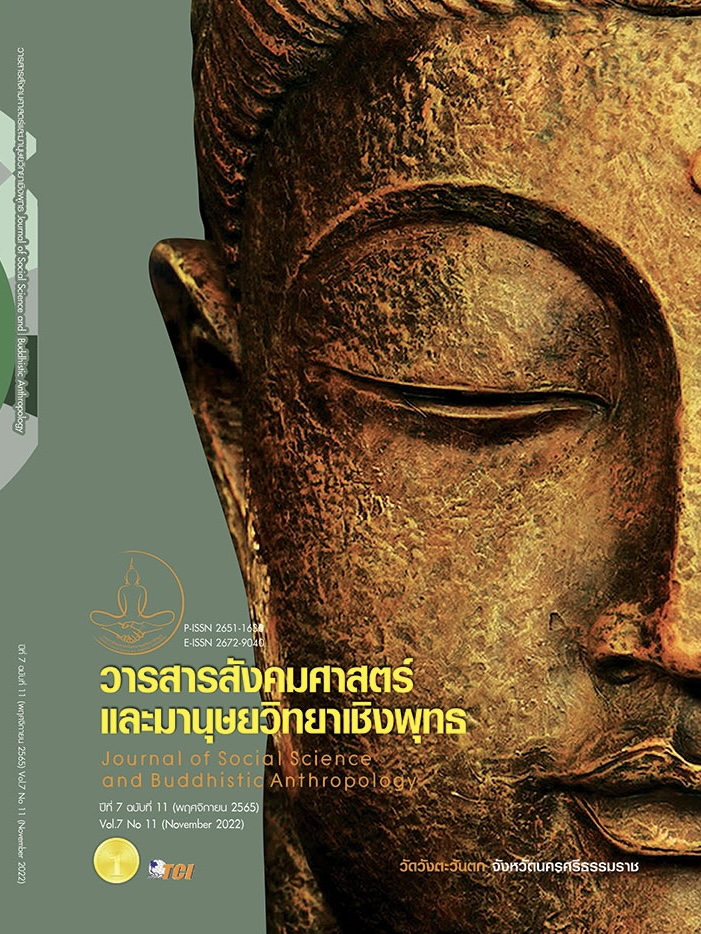DEVELOPMENT OF INSTRUCTIONAL LEADERSHIP FACTORS AND ASSESSMENT FOR TEACHERS OF SCHOOLS UNDER THE BANGKOK ARCHDIOCESE
Keywords:
Development of Factors, Instructional Leadership, Assessment for TeachersAbstract
The objectives of this research were to development of Instructional Leadership factors for teachers and assessment for teachers of Schools under the Bangkok Archdiocese. It is a qualitative research. There are 3 steps of this research as follows: 1) A study of 22 sources of documents, research papers, textbooks, academic journals related to Instructional leadership, and in-depth interviews with 7 experts. 2) Developing Instructional Leadership factors for teachers of Schools under the Bangkok Archdiocese by using the data for Content Analysis and 3) Developing an Instructional Leadership factors assessment for teachers of Schools under the Bangkok Archdiocese by confirming the factors and behavioral indicators of Instructional leadership for teachers. By in-depth interviews with 5 experts. The results showed that: 1) The development factors of Instructional leadership for teachers consisted of 3 factors: 1.1) Continuous Learner, there are 3 aspects: 1.1.1) Teachers study/search for knowledge about school curriculum and always use it. 1.1.2) Teachers always study/search for knowledge about the teaching and learning process. 1.1.3) Teachers are always studying/researching about technology to assist teaching. 1.2) Communicator has 2 aspects: 1.2.1) Teacher transfers knowledge give feedback Advise/recommend to children and fellow teachers. 1.2.2) Able to work with others. 1.3) Change Agent has 2 aspects: 1.3.1) Teachers initiate change 1.3.2) Adapt to changing situation. 2) The Instructional Leadership Assessment Tool for Teachers was a rubric scale. The 3-level behavior-determining method had a consistency index of 0.60 - 1.00, indicating that It can be used effectively to assess Instructional leadership for teachers.
References
กรมวิชาการ กระทรวงศึกษาธิการ. (2545). แนวทางการวัดและประเมินผลการเรียน. กรุงเทพมหานคร: โรงพิมพ์คุรุสภาลาดพร้าว.
ธนกฤต พราหมน์นก. (2560). การศึกษาองค์ประกอบด้านภาวะผู้นำเชิงเทคโนโลยีของผู้บริหารโรงเรียนมัธยมศึกษา สังกัดสำนักงานคณะกรรมการการศึกษาขั้นพื้นฐาน กระทรวงศึกษาธิการ. วารสารศรีปทุมปริทัศน์, 17(1), 45-53.
ธีรธร สุธีธร และคณะ. (2559). ภาวะผู้นำทางวิชาการของครูยุคใหม่. วารสารบริหารการศึกษา มศว, 13(24), 54-61.
ฝ่ายการศึกษาอัครสังฆมณฑลกรุงเทพฯ. (2562). เอกสารประกอบการประชุมสามัญประจำปี 2562 ครั้งที่ 2. กรุงเทพมหานคร: กลุ่มงานวิชาการ.
ไพฑูรย์ สินลารัตน์. (2557). ทักษะแห่งศตวรรษที่ 21 ต้องก้าวให้พ้นกับดักของตะวันตก. กรุงเทพมหานคร: มหาวิทยาลัยธุรกิจบัณฑิตย์.
สถาบันพัฒนาความก้าวหน้า. (2553). ยุทธศาสตร์การพัฒนาวิชาชีพผู้บริหารสถานศึกษาตามหลักเกณฑ์ใหม่. กรุงเทพมหานคร: เอส.พี.เอ็น การพิมพ์.
สำนักงานคณะกรรมการการประถมศึกษาแห่งชาติ กระทรวงศึกษาธิการ. (2540). การวัดและประเมินผล สภาพแท้จริงของนักเรียน. กรุงเทพมหานคร: โรงพิมพ์คุรุสภาลาดพร้าว.
สุขุม เฉลยทรัพย์ และคณะ. (2551). เทคโนโลยีสารสนเทศ. (พิมพ์ครั้งที่ 6). กรุงเทพมหานคร: มหาวิทยาลัยราชภัฏสวนดุสิต.
สุวิมล ว่องวานิช. (2546). การประเมินผลการเรียนรู้แนวใหม่. กรุงเทพมหานคร: โรงพิมพ์แห่งจุฬาลงกรณ์ มหาวิทยาลัย.
อาภารัตน์ ราชพัฒน์. (2554). โมเดลสมการการพัฒนาตัวบ่งชี้ภาวะผู้นำครูในสถานศึกษาขั้นพื้นฐาน. ใน ดุษฎีนิพนธ์ปรัชญาดุษฎีบัณฑิต สาขาวิชาการบริหารการศึกษา. มหาวิทยาลัยขอนแก่น.
อุษาวดี จันทรสนธิ. (2550). ภาวะผู้นำของครูในสถานศึกษา. วารสารศึกษาศาสตร์ มสธ, 1(2), 50-62.
George, D. & Mallery, M. (2010). SPSS for Windows Step by Step: A Simple Guide and Reference, 17.0 Update, 10th Edition. Boston: Pearson.
Hallinger, P. (2011). Leadership for learning: lessons from 40 years of empirical research. Journal of Educational Administration, 49(2), 125-142.
McEwan, E. K. (2003). Ten Traits of Highly Effective Principals: From good to great performance. Thousand Oaks: CA: Sage.
Popham, W. J. (2007). Classroom assessment: what teachers need to know. (5th ed). Boston: Pearson.
Strodl, P. (1992). A model of teacher leadership. Paper presented at the annual meeting of the Eastern Educational Research Association. SC: Hilton Head.
Downloads
Published
How to Cite
Issue
Section
License
Copyright (c) 2022 Journal of Social Science and Buddhistic Anthropology

This work is licensed under a Creative Commons Attribution-NonCommercial-NoDerivatives 4.0 International License.









